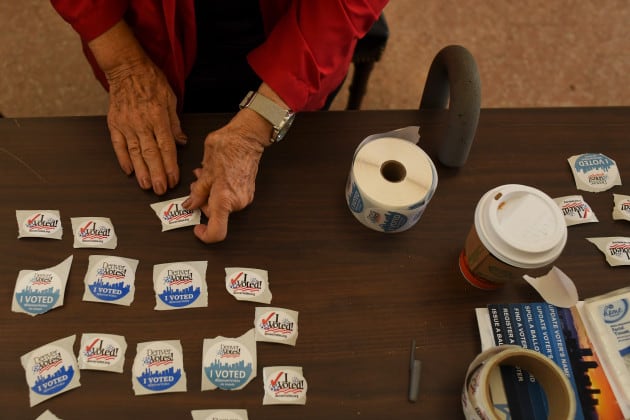Election Day is Nov. 8 this year, but since every eligible registered Colorado voter will receive a mail ballot in October, you can vote sooner.
The Colorado News Collaborative has compiled answers to frequently asked questions about the voting process in our state as we near a pivotal midterm election that includes our governorship, a U.S. Senate seat and 11 statewide ballot issues. More information about elections in our state is also available directly from the Colorado Secretary of State Office (at GoVoteColorado.gov).
Registration
How can I register to vote in Colorado?
Colorado has automatic voter registration when you interact with certain state agencies — like the Department of Motor Vehicles — and share personal information like your name, address and date of birth. So you might already be registered.
If you’re not, you can register online or mail in a paper registration form. Voter registration will also be available at voter service and polling centers between Oct. 24 and Election Day on Nov. 8.
Do I have to register to vote every year?
No, as long as your voter registration is active, which you can check online. “Active” means you voted in the most recent election or you recently registered or updated your registration information.
How can I look up my voter registration status?
The Colorado Secretary of State website has a lookup page online. There, you can see your voter status, party affiliation and other key info about your profile, as well as submit changes.
What if I moved within Colorado since the last election?
If you have already changed your address at the Department of Motor Vehicles, your voter registration address should be automatically updated. If that’s not the case, you can change your voter address online. (See the next question about how long you need to have lived in Colorado in order to register.)
Who is eligible to register to vote?
You must be 18 years of age or older to vote (you can actually be as young as 16 to just register). You must be a U.S. citizen, as well as a Colorado resident for at least 22 days before the election. If you’re currently unhoused/homeless, you can list any address the state considers a “home base,” including a shelter.
I have a felony conviction — can I vote in Colorado?
If you’re currently incarcerated, no, you cannot vote. But if you’re on parole, yes, you can vote. If your conviction was in the past and you’ve served your sentence, yes, you can vote.
I’m a college student in a different state who is originally from Colorado. Can I vote in Colorado?
It depends. You can either keep your Colorado residency and vote by mail as a Coloradan. Or if you establish residency (which varies by state, but can include conditions such as getting a new driver’s license or living there for a certain duration) in the different state where you’re going to college, you vote there, not here. You cannot vote in two states.
I’m a college student from a different state going to school in Colorado. Can I vote here?
If you decide to establish residency here in Colorado, yes, you can vote here. But please note that you cannot vote in two states and, by establishing residence here, give up your residency elsewhere.
I’m actively serving in the military outside Colorado or living overseas. How can I vote?
Under the federal Uniformed and Overseas Citizens and Absentee Voting Act (“UOCAVA”), you, your spouse/partner and dependents are permitted to vote and get extra time to do so. Your mail ballot can be sent to your current mailing address 45 days before the election (so earlier than most voters) and you get extra time to send it back. It can reach Colorado as late as the eighth day after the election — Nov. 16, this year. You also have an online option to securely upload and send an image of your ballot
Voting by mail
Who gets a mail-in ballot?
All active registered voters in Colorado automatically get a mail ballot, which is sometimes also called an absentee ballot.
When will I receive my mail-in ballot?
Ballots begin to be mailed out to active registered voters between Oct. 17 and Oct. 21. Counties are supposed to mail overseas and military voters ballots 45 days before the election, but those voters have an online option to upload and send an image of their ballot, as well.
Where will my ballot be sent?
Your mail ballot will be sent to the mailing address you provided during voter registration or when you updated your registration.
Do I have to vote by mail just because I get a mail ballot?
No. You can still vote in person (see FAQs on in-person voting below), but most of your fellow Coloradans choose the mail option. In 2021, about 98% of Republican, Democrat and unaffiliated voters used mail ballots, according to the Colorado Secretary of State office.
If I don’t get a mail-in ballot, how can I request one?
You can register to vote or update your registration by Oct. 31 and can then get a mail ballot. After Oct. 31, you can pick up a ballot at your county clerk’s office or at a polling center. Also, you can vote in person, instead. Call your specific county’s election office – or see its website – for details.
When do I have to send my mail-in ballot back by?
Unless you’re stationed or temporarily living overseas, Yyour county clerk office has to receive your mail ballot by 7 p.m. on Election Day, Nov. 8 in order for it be counted. That means if you’re mailing your ballot via the U.S. Postal Service (USPS), you’ll want to put it in the mail at least a week before Election Day (ask your local USPS branch when the cutoff is for your community). If you’ve missed the cutoff to mail it, your county will have secure drop boxes in which you can deposit your completed ballot or you can drop it off at a polling center. See a list on your county website, but here, for example, is information about drop box locations in Denver, Douglas, Jeffco and Mesa counties.
The only deadline exception is for military and overseas voters who must mail or uploadsend their ballot by 7 p.m. on Nov. 8, but it can reach your county election office as late as the eighth day after the election — Nov. 16, this year.
Don’t forget to sign the envelope of your mail ballot or it won’t get counted. If your signature is missing on your envelope, you’ll get a letter letting you know and you’ll have to provide your signature within eight days after Election Day. If you decide not to drop off your ballot at a drop box and want to mail your ballot via the USPS, be sure to include postage (the amount varies county to county but many counties include the postage amount in the ballot instructions).
Are ballots available in languages other than English?
Colorado’s Secretary of State’s office has set up a multilingual hotline where interpreters can explain ballot content to voters in their preferred language. For Spanish-language voters, some counties might also provide a ballot in Spanish.
How do I learn more about the issues and candidates?
In addition to reputable local news outlets, the nonpartisan League of Women Voters of Colorado has put together a guide on the statewide amendments and propositions on the ballot. The state also mails all registered voters a blue, paper election booklet that explains each statewide proposition and amendment on the ballot, as well as what a “yes” or “no” vote means for each.
Voting in person
When can I vote in person?
Between Oct. 24 and Nov. 8 (except Oct. 29, Oct. 30 and Nov. 6). See the state’s election calendar for more details and deadlines.
Where do I vote in person?
Check online to see your polling place in your community.
When is Election Day?
Election Day 2022 is Nov. 8, but you don’t have to wait until that day to vote (see above). If you do decide to wait until Election Day to vote in person, polls are open 7 a.m. to 7 p.m. Mountain time. If there are long queues on Election Day and you’re still waiting in line at 7 p.m., you’ll still be allowed to vote. Same-day voter registration is available, if needed. Under Colorado law, if you have to vote during the workday with some conditions, your employer must pay you for up to two hours to do so.
What should I bring to vote in-person?
You must bring an acceptable ID. If your ID lists an address, it must be in Colorado.
Are there voting options for voters with special needs?
Yes. Every polling location must have at least one accessible option, such as accessible voting machines or wheelchair-accessible paths.
Election security
How secret is my vote? Does anyone know who or what I voted for?
Your ballot and whomever or whatever you voted for is totally anonymous. The only thing that is public information is your party affiliation associated with your voter registration, which you can update online.
How common is voter fraud in Colorado?
Not common at all. The conservative-leaning Heritage Foundation has documented only 16 cases of fraud in Colorado since 2005. That’s 16 cases out of millions of ballots cast.
How can I be sure my ballot is counted?
Colorado has one of the most advanced and secure voting processes in the United States. Some experts have characterized it as the “gold standard” nationally.
Colorado counties use BallotTrax, a free service for voters that allows you to track the point from which it is mailed or gathered from a collection box to when it is counted. You can get text or email notifications. Think of it like tracking an online shopping order.
After the election, bipartisan teams and county clerks across Colorado do audits of paper ballots to confirm results. “No bipartisan audit has ever found a ballot that wasn’t tabulated correctly,” according to the Colorado Secretary of State office.
Other security measures in Colorado include: background checks for election staff, bipartisan teams conducting tests of election machines, signature verification, and a partnership with the National Guard to monitor critical elections technologies, like the statewide voter registration system, for cyber threats.
Can I be a poll watcher?
Yes. Poll watchers are members of the community who volunteer to observe the conduct of an election. Call any county clerk and recorder office to find out how to get involved. You’re allowed to watch in any county, not just the one you live in.
Is Colorado taking any steps to improve election security?
Colorado’s new Election Security Act (signed into law earlier this year) creates additional measures to protect our vote, including but not limited to: year-round video surveillance of voting system components, felony prosecutions for tampering with voting equipment, whistleblower protections for reports of election law breaches and a $1 million grant program for counties to upgrade security around voting equipment.
Have more questions about voting in Colorado? Email us at info@colabnews.co and put “Elections” in the subject line. You can also find more information directly from the state at GoVoteColorado.gov.
This story is brought to you by COLab, the Colorado News Collaborative, a nonprofit coalition of more than 170 newsrooms across Colorado working together to better serve the public. Chalkbeat is a founding member of COLab. Learn more at https://colabnews.co






